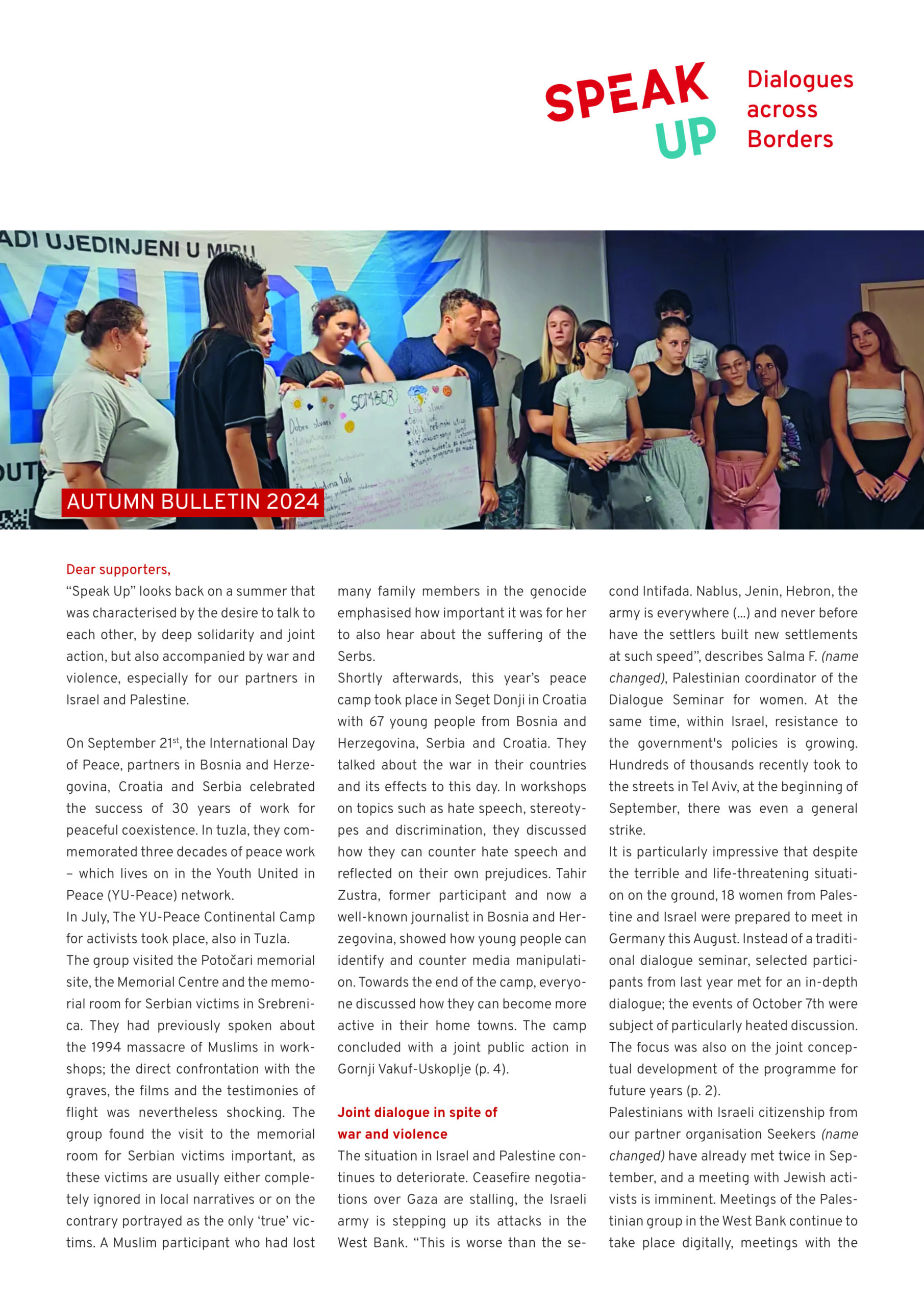
Dear supporters,
“Speak Up” looks back on a summer that was characterised by the desire to talk to each other, by deep solidarity and joint action, but also accompanied by war and violence, especially for our partners in Israel and Palestine.
On September 21st, the International Day of Peace, partners in Bosnia and Herzegovina, Croatia and Serbia celebrated the success of 30 years of work for peaceful coexistence. In tuzla, they commemorated three decades of peace work – which lives on in the Youth United in Peace (YU-Peace) network.
In July, The YU-Peace Continental Camp for activists took place, also in Tuzla.
The group visited the Potočari memorial site, the Memorial Centre and the memorial room for Serbian victims in Srebrenica. They had previously spoken about the 1994 massacre of Muslims in workshops; the direct confrontation with the graves, the films and the testimonies of flight was nevertheless shocking. The group found the visit to the memorial room for Serbian victims important, as these victims are usually either completely ignored in local narratives or on the contrary portrayed as the only ‘true’ victims. A Muslim participant who had lost many family members in the genocide emphasised how important it was for her to also hear about the suffering of the Serbs.
Shortly afterwards, this year’s peace camp took place in Seget Donji in Croatia with 67 young people from Bosnia and Herzegovina, Serbia and Croatia. They talked about the war in their countries and its effects to this day. In workshops on topics such as hate speech, stereotypes and discrimination, they discussed how they can counter hate speech and reflected on their own prejudices. Tahir Zustra, former participant and now a well-known journalist in Bosnia and Herzegovina, showed how young people can identify and counter media manipulation. Towards the end of the camp, everyone discussed how they can become more active in their home towns. The camp concluded with a joint public action in Gornji Vakuf-Uskoplje (p. 4).
Joint dialogue in spite of war and violence
The situation in Israel and Palestine continues to deteriorate. Ceasefire negotiations over Gaza are stalling, the Israeli army is stepping up its attacks in the West Bank. “This is worse than the second Intifada. Nablus, Jenin, Hebron, the army is everywhere (…) and never before have the settlers built new settlements at such speed”, describes Salma F. (name changed), Palestinian coordinator of the Dialogue Seminar for women. At the same time, within Israel, resistance to the government’s policies is growing. Hundreds of thousands recently took to the streets in Tel Aviv, at the beginning of September, there was even a general strike.
It is particularly impressive that despite the terrible and life-threatening situation on the ground, 18 women from Palestine and Israel were prepared to meet in Germany this August. Instead of a traditional dialogue seminar, selected participants from last year met for an in-depth dialogue; the events of October 7th were subject of particularly heated discussion. The focus was also on the joint conceptual development of the programme for future years (p. 2).
Palestinians with Israeli citizenship from our partner organisation Seekers (name changed) have already met twice in September, and a meeting with Jewish activists is imminent. Meetings of the Palestinian group in the West Bank continue to take place digitally, meetings with the other two groups are still not possible due to the security situation. Furthermore, with an ongoing series of lectures and discussions in Israel, Seekers is countering divisive discourse spread widely in Israeli society right now. At the same time, the recruiting process for youngsters wanting to join the new bi-annual groups has begun. They are to enter into a dialogue process from the end of 2024 onwards. “We are also developing our methodological tools, advising people and organisations who ask us for help (…) we are doing all this while fighting despair,” reports Karim A. (name changed), Palestinian coordinator in the West Bank.
